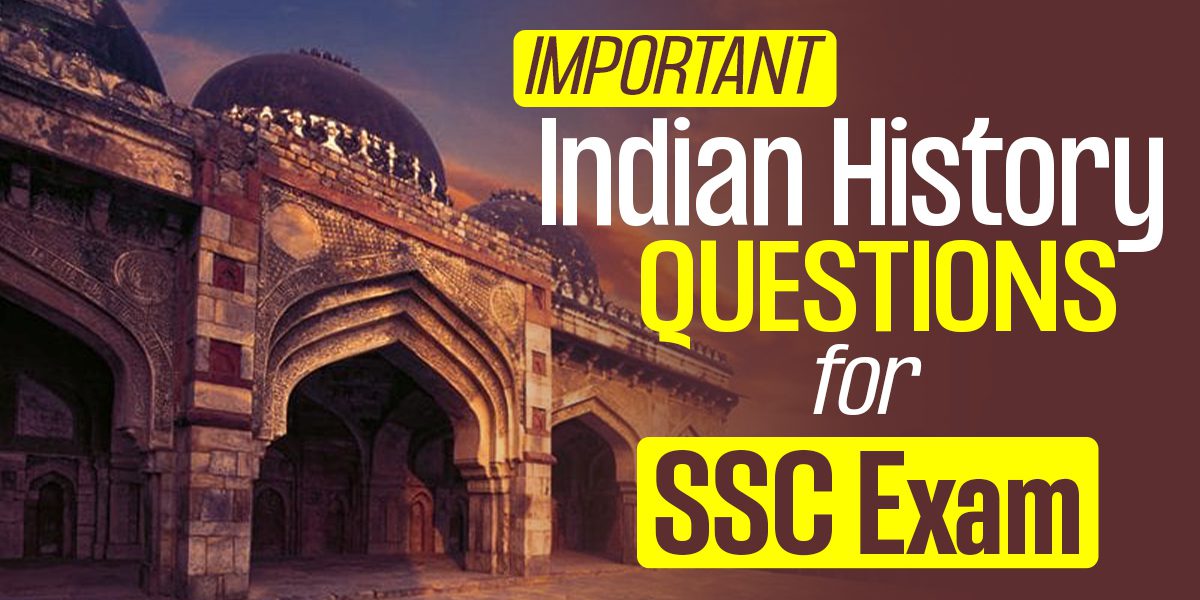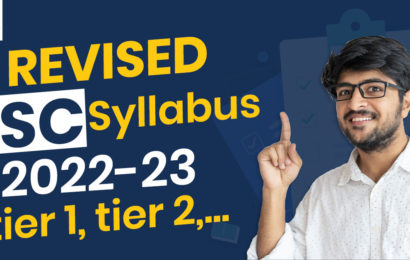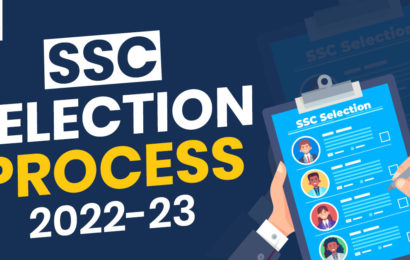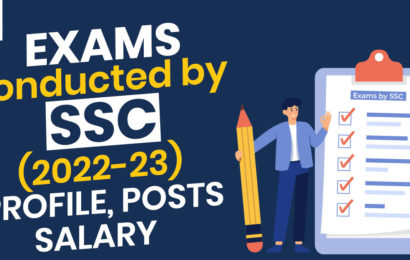
In the SSC exam, Indian History holds a significant weightage. If you want to crack the written exams of SSC exams, you must work hard on preparation, while learning all the important topics related to the history of India. It is divided into three parts: Ancient history, Medieval history, and Modern history.
You must practice Indian history questions with mock tests and online quiz on Indian history for stronger preparation. Below, we have curated some of the most important GK Indian history questions asked in previous SSC exams to give an idea about what kind of questions come in the exam.
Indian History MCQ for SSC
Test your level of preparation in the history subject and check your knowledge by answering the following Indian ancient history quiz:
1. Who founded The Servants of India Society?
- GK Gokhale
- MG Ranade
- GB Tilak
- Bipin Chandra Pal
Answer is D
2. Mahatma Gandhi was influenced by the literary work of which writer?
- Leo Tolstoy
- Bernard Shaw
- Karl Marx
- Lenin
Answer is A
3. Samrat Ashoka was influenced to adopt Buddhism by which monk?
- Brahma Gupta
- Upa Gupta
- Vishnu Gupta
- Brihadratha
Answer is B
4. Who defeated Harshvardhana?
- Sasanka
- Pulakesin II
- Prabhakaravardhana
- Narasimhasvarma Pallava
Answer is B
5. Which Mughal emperor was illiterate?
- Akbar
- Shah Jahan
- Jahangir
- Aurangzeb
Answer is A
6. Where did the Lord Buddha attain enlightenment?
- Sarnath
- Kapilavastu
- Rajgriha
- Bodh Gaya
Answer is D
7. Which of the following Governor-General is related to Doctrine of Lapse?
- Lord Ripon
- Lord Dalhousie
- Lord Bentinck
- Lord Curzon
Answer is B
8. Who gave the call of the Back of The Vedas?
- Raja Ram Mohan Roy
- Aurobindo Ghosh
- Swami Dayanand Saraswati
- Swami Vivekananda
Answer is C
9. The national leaders of India boycotted the Simon Commission because:
- It didn’t meet the requirements of Indians
- The Commission members were anti-Indians
- All the Commission members were Britishers
- They believed that it was an eyewash
Answer is C
10. Which Britisher called the Revolt of 1857 a national revolt?
- Lord Dalhousie
- Lord Canning
- Lord Ellenborough
- Disraeli
Answer is D
11. Which city of the following is known as the Shrimp Capital of India?
- Mangalore
- Nagapatnam
- Kochi
- Nellore
Answer is D
12. Who established the Lodi dynasty?
- Sikandar Lodi
- Ibrahim Lodi
- Bahlol Lodi
- Khizr Khan
Answer is C
13. Which of the following is considered the most crucial source of information for Ancient India’s cultural history?
- Literature and epics
- Archaeological excavations
- Antiquities and monuments
- Inscriptions and coins
Answer is A
14. Where was the granary found at Harappa was located?
- Near the river Ravi
- In the Lower town
- Behind the western gate of the city
- Within the citadel at Mohenodaro
Answer is A
15. Which Indus cities had houses with doors on the streets?
- Lothal
- Banawali
- Surkotada
- Chanhudaro
Answer is A
16. The famous book Padmavat was written by:
- Hasan Nizami
- Nakhshabi
- Malik Muhammad Jayasi
- Al Biruni
Answer is C
17. The Ellora caves and rocks are related to which religions?
- Hindu, Jain, and Buddhism
- Jain and Buddhism
- Only Buddhism
- Hindi and Muslim
Answer is A
18. Who were the first invaders of India?
- Arabs
- Afghan
- Turks
- Mongols
Answer is A
19. Paintings in Ajanta and Ellora caves represent the art development under:
- Pallavas
- Pandyas
- Rashtrakutas
- Chalukyas
Answer is C
20. Who was the editor of ‘Young India’ and ‘Harijan’?
- Mahatma Gandhi
- Jawaharlal Nehru
- BR Ambedkar
- Subhash Chandra Bose
Answer is A
21. Which operation did British government begin for arresting the leaders of Quit India Movement?
- Operation Thunderbolt
- Operation Blue Star
- Operation Reander Paste
- Operation Zero Hour
Answer is A
22. Which Act led to the Jallianwala Bagh massacre?
- The Public Safety Act
- Vernacular Press Act
- The Arms Act
- The Rowlatt Act
Answer is D
23. Who wrote the famous Bengali poem titled Bidrohi?
- Kazi Nazrul Islam
- Sambhunath Pandit
- Rabindranath Tagore
- Bankim Chandra Chattopadhhyaya
Answer is A
24. Who drafted the fundamental rights resolutions for the Karachi Session in 1931?
- Acharya Narendra Deo
- Subhash Chandra Bose
- Jawaharlal Nehru
- Maulana Abul Kalam Azad
Answer is C
25. What was the purpose of the Government of India Act 1935?
- All India federation at the center
- Foundation of federal court
- Provincial autonomy
Which answer is correct?
- 1 only
- 1 & 2 only
- 2 & 3 only
- all of them
Answer is D
Wrapping up:
These GK Indian history questions will surely help you prepare well for the SSC exam. Along with these, use effective learning and preparation tips to ensure that you don’t lag anywhere during the exam.
Have any doubts? Let us know by commenting below.
Read more – General Science Questions for SSC Exam



